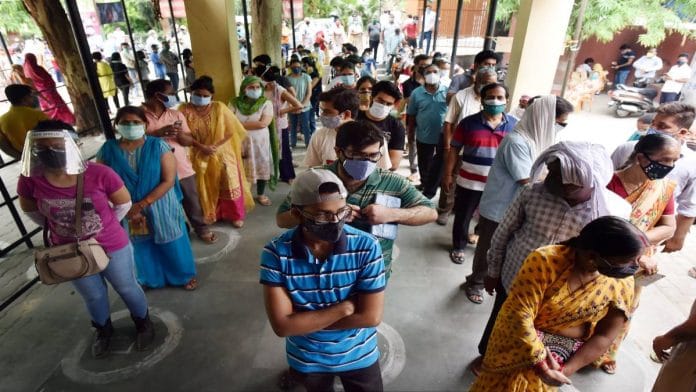New Delhi: India administered about 56 per cent (over 43 crore) of all Covid vaccines given so far in the months of July, August up until 16 September. However, the government is yet to release a causality assessment report on cases of Adverse Events Following Immunization (AEFI) since 12 July. That last report was approved by the National AEFI committee, headed by Dr Satinder Aneja, in its meeting on 28 June.
“We have submitted the reports for meetings held till now. They are with the ministry (of health and family welfare). It sometimes takes time for them to translate the report etc., before they put it up on the website,” Dr Aneja, who is a professor and head of Department of Pediatrics, Sharda University, told ThePrint.
ThePrint reached the health ministry over the phone and email to ask about the delay and when new reports on AEFI causality assessment could be expected, but did not receive a response till the time of publishing this report.
While daily AEFI numbers are reported on the CoWin website, the assessment report is important for understanding the profiles of such cases.
Till 30 June, India had administered 33,57,16,019 Covid vaccine doses. As of Thursday morning, the number was 76,57,17,137 doses. With more people continuing to be vaccinated, it remains important to assess how the profile and incidence of AEFI is changing and also keep track of post-vaccination deaths, if any, to understand if it is causally related to the shot.
Since the national Covid immunisation programme began on 16 January this year, the age profile of recipients has gotten significantly younger. AEFI cases often vary with age, but with reports not yet updated, that information is not in the public domain.
“The reports keep coming in but it is the analysis that takes time. One has to meticulously go through all the records, sometimes call for documents from the hospital. Often they are not very prompt in supplying the documents asked for, so you need to follow up. The analysis is the key. Unanalysed reports should not be made public because people may misunderstand, may misinterpret the risks,” a senior official in the health ministry, on the condition of anonymity, told ThePrint.
Also read: Why 25-50% of vaccine side-effects are ‘anxiety-related and not a result of Covid jab’
AEFI reporting not robust
Sources in the AEFI committee said that since analysis takes time, there is usually a lag. But it is also a fact that in India, reporting of AEFIs is not very good.
“People often do not report AEFIs. As for the committee, we look at only serious AEFIs. Some amount of body ache, fever etc., are expected and that is not what we look at. We look to establish causality of other serious events. We have to look at it in totality for the analysis. For example, if a person who is 80- or 90-years-old and has comorbidities, when that person has an AEFI, it has to be seen in that context. That is why it takes time,” a member of the committee said.
Fever, body ache and pain at the site of injection are some of the most common after-effects of the vaccination and the government recommends use of paracetamol in such cases.
The last report in the public domain analysed 88 AEFIs. It concluded: “61 out of 88 cases for which causality assessment has been done, (were) found to have consistent causal association to vaccination.”
Of these 61 cases, the report said, 37 were vaccine product-related reactions, 22 were immunisation anxiety-related reactions, and two were immunisation error-related reactions. There were 18 cases that had an inconsistent causal association to vaccination (coincidental and so not linked to vaccination), including three deaths. Nine cases were put under the “indeterminate category”, including two deaths.
Vaccine side-effects
The Government of India had listed possible side-effects of all three vaccines currently in use in the immunisation programme.
For Covishield, the common side effects include pain at the injection site, headache, fatigue, body ache and nausea. “Very rare events of demyelinating disorders have been reported following vaccination with this vaccine but without the causal relationship establishment,” reads the FAQ document issued by the health ministry.
Demyelinating disorders are a result of damage to the protective sheath that covers nerve fibres of the brain, optic nerve and the spinal cord.
For Covaxin, the additional side-effects include abdominal pain, nausea and vomiting, dizziness-giddiness, tremors, sweating, cold and cough.
For Sputnik V, the side-effects could include dyspepsia (indigestion), loss of appetite and sometimes, enlarged regional lymph nodes.
(Edited by Manasa Mohan)
Also read: Adverse events reported in just 0.08% of 15 lakh Covid vaccinations in first week






